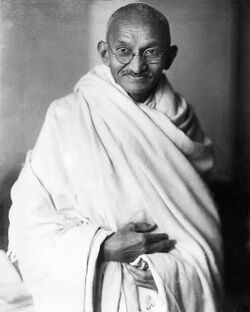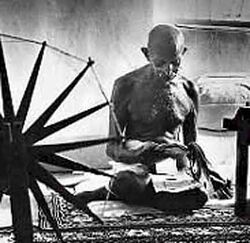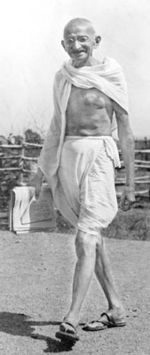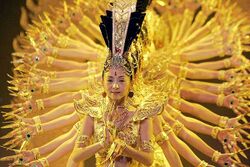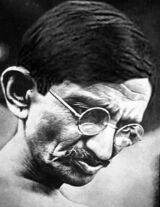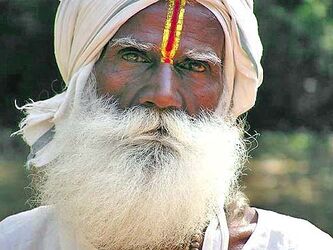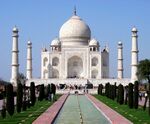Mohandas Gandhi
Vandalism will result in you being Yoga Blasted by HIM!
|
Political activist, lawyer, non-violent inner-cage fighter, freedom fighter, ladies man, and peaceful protester, Mohandas Karamchand Gandhi (मोहनदास करमचंद गांधी) practiced nonviolence by only taking out his anger on his wife, who bore the brunt of his peace.
Behind his back his fans - mostly hippies or wannabees referred to by the media as the 'SatyaGroupies" - called Gandhi "Mahatma", meaning "Great Soul". He never liked the title much, never enjoyed it, and asked his fans to stop calling him that. He knew exactly what he was: just a guy, a lawyer as well, trying some new ways to change things and looking rad while doing that.
Then again, he didn't want to be called "pious midget grabby-hands destitute asshole" either, but plenty of Indian women did call him that. Gandhi would just smile, rock side to side, and bless them, making them even madder. At which point the real housewives of Porbandar would fling their kitchen utensils at him. Run, Gandhi, run!
Early Life
He was born, grew up, and subsisted on rice, beans, seasonings, and sunshine. He had a rather nice childhood.
As a child he was so small that his parents used him for a doorstep, and his friends - who called him "Ganjaji" - used him as a goal line. Throughout his life Gandhi slipped into movie theaters on a children's discount. When pushed, he would claim to stand slightly over 4 feet tall and weigh close to 60 pounds, showing that big things do come in small packages. Or so he told the ladies.
Gandhi is famous for wearing nappies in public, but trying on and walking around in babies clothes was something which he only started playing at when he had earned enough money to pay a tailor to make him a pair of very nice trousers. At that exact moment he realized that instead of buying clothes he should instead give his money to beggars in his own family and walk around like a crazy man.
Rise to Power
Before the British conquered India, the country was a peaceful monkey-God utopia, similar to Egypt when the stonebuilders ruled, or Germany before Hitler went insane. Communism prevailed, by a mandate from the masses, but before long India became little more than a large factory for producing war machines and contraceptives for the greedy white limey bastards who were always around whenever you tried to go anywhere.
In fact, Gandhi became aware of the racial and class discrimination in India when he noticed that his country, neighborhood, and home were occupied by British troops. He decided to make Britain leave the premises. Even as Gandhi, as a young man, first contemplated what this would entail, Britain asked him to be a dear and go down to the green grocer to pick up some milk and cumin, please, and would you close the door on the way out?
One fateful day, while rooting through a dumpster behind an ashram for some Vedas, Gitas, or hindu girly magazines (you know the ones, where they dance) they might be throwing out, Gandhi discovered grimy copies of "Okay, You Say The Kingdom Of God Is Within Me? Huh?"" by Lew "Лев Никола́евич Толсто́й" Tolstoy and "Until We Dance" by John "Don't Rus Me" Ruskin. Fascinated by these two author's large vocabulary and bushy beards, the young man decided to work for the good of his people and become their leader against the British. Nobody else was doing that, so the position was open.
Well, Gandhi went to work. Speaking on street corners, organizing rallies, thumbing his nose at Brit soldiers and running away (Run, Gandhiji, run!), Gandhi laid the groundwork for harassing the English: rather than being a bothersome ninny he'd stare them down by not cooperating in the staredown. Sadly, the Indian people were too anal to leave their curry houses and follow Gandhi, and instead they publicly humiliated him by insulting his loincloth (a deadly insult in those days, but maybe warranted in his case).
Mad with peaceful rage, fuming by praying, Gandhi swore to the many armed goddess that one day he would become the King of all the Indians.
From that day on, British, South African, and Indian lawmakers, politicians, and military officers were the subject of his endless pranks. Gandhi gloated as people began to join him, and chuckled as his political opponents lost momentum almost overnight - well, overdecades. Gandhi watched the British Empire very very very slowly melt away as he gained more and more power and held it in a clenched fist of peace.
Racism and Food Habits
“Be the change you want to see in the world”
Gandhi loved to hang out with the so-called Untouchables, to grab his share of free food. He often said that he was an untouchable in the real sense of the word. Gandhi would pick up food from the floor and eat it, wear rags with peeky-holes for some parts of him, itch his nose in public, and purposely walked in the midst of the rich who would move aside, not to honor him but from the smell. Only Gandhi would hug and triple-snuggle up to dead untouchables, and since even the untouchables wouldn't do that, they began to shun Gandhi too.
But Gandhi didn't let being shunned by untouchables stop his fun. Far from it! He enjoyed sneaking up behind an untouchable, touching him on the shoulder, and either running away or doing that thing where the guy turns around and you sneak behind his back and touch him again. It never got old.
As for food habits, Gandhi, a lifelong vegetarian, kept to his childhood diet of rice, beans, seasonings and sunshine.
He had a rather nice adulthood.
Gandhi's Nonviolent Movements
“ They're not so tough! Look at their teeth!”
Not much to write home about. In later years Gandhi's direct action movement accomplishments took on an all-out-of-proportion status. What he did best was practice and perfect nonviolent noncooperation, talking his entire nation into not doing this, or don't do that. And they didn't. He'd ask them to change their buying patterns, and they would. In the end he was just making things up from stuff he saw on tee-shirts. Everyone assumes Gandhi organized mass nonviolent movements because the black guys in the United States, mainly James Bevel and Martin Luther King, Jr., studied and used Gandhi's writings and then built on what they and Gandhi had learned. Unlike Gandhi however, these guys could dance.
Then there was that movie, which implied that Gandhi organized a major movement every other week or so but actually he was aging several decades per reel. Fact is he just kept doing lots of noncooperating, sometimes not cooperating for days at a time. And the nation copy-catted him so often that the British nonviolently tore their hair out.
Besides not doing something, Gandhi published newspapers and inspired his peeps. He led a few nationwide boycotts in the 1910s and 1920s, and made a good impoverished living asking Indians to not pay taxes or buy British clothes, tea, or holy "British escorts". As Gandhi was doing all of this he actually was spending most of his time working on his spinning wheel. He'd spin straw into cotton, cotton into wool, and wool into nappies. He was always nagging everyone else in the country to get a spinning wheel so that they could totally abandon the very popular British-made and British taxed colorful clothing. He wanted the entire nation to spin cotton and make nappies, then wear these homemade rags around town like they were coolies or untouchables. Everyone started looking at him like he was crazy again.
But mainly Gandhi did politics, and for a 60-pounder he did it very well indeed. He led and fronted for a couple of political parties and Sitar Blues bands over the years, and gave them all backbone by making feigned-frail public appearances. He'd use a stick to walk out on stage, when just before the show he was putting in five miles just to work some sweat up. And by the time he was really tuckered out and done, his friends in high places controlled both India and the music charts, and they could tell the whole country what was good for it. They also formed one big group of lentils and rice fanatics, and politely pointed the British to their hats and coats, then to the door. "Don't let it hit you on the way out," they prayed.
Before that happened, Gandhi's actual big nonviolent moment and movement whoop-de-doo was his 1930 Salt March to the Sea, which was like occupy but with the sea.
Occupy the Sea
"Hey hey, ho ho, the Indian Ocean has to go" was the chant as tens of thousands of Indians joined Gandhiji as he marched down many roads must a man walk down and finally reached the sea. What was he complaining about? That people had to pay taxes on salt, with the money going to the British. This was like rubbing salt in the wounds of nationalistic fervor, literally. So Gandhi reasoned, "Hey (hey, ho ho...), dudes, come on man, it's just salt from the Indian ocean. I'm going to go down there and grab me some. Anyone who wants to come with me can walk along."
When he and his circle of tens of thousands of friends finally reached the sea, lots of people were arrested. But they got some salt, put it on the rims of their glasses, and started to drink. Drink a toast to the British leaving 16 years later!
A Changing Regime
The more political and sacred executive power Gandhi gained, and the more years he spent in prison, the more his sanity seemed to suffer and the more tits he sold. He got really bored. Then on top of that, after a few decades his epicurean lifestyle, salt consumption, time in prison, and his high-carb diet resulted in what appeared to be extreme brain damage. Gandhi, by now called "The father of his country", would wander around barefoot with his loincloth slipping off at inappropriate moments and, instead of sandaling up and re-clothing his loins, he'd scream in the public square and accuse members of his own household of crimes ranging from “looking funny” to “breathing too heavily” to "who stole my lighter?"
Paranoia and dementia seemed to have set in, and Gandhi pretended to outlaw squirrels and possums, declaring them to be “disgusting, perverted, and monstrous creatures". He even went so far as to call upon the League of Nations to accept his “final solution to the Woodland Question.” As he became more of a scary skeletal outline of his former self, his perceived outlook on life shifted towards the morbid, the insane, the absurd, and the desperate. But behind it all this barefoot and bored movement strategist and grandmaster satirist smiled, and laughed and laughed and laughed at the commotion. He was a very strange man.
Whoops, no rice for you!
If there was anything Gandhi loved more than a new rice bowl it was the feeling you get when you wake up in the morning, a kitten curled up in your lap and a song in your fart, and see the sunrise. Gandhi thought that when he showed the Brits the door that all the Indians would feel like they had kittens in their laps, songs in their farts, and had just seen a beautiful sunrise. Only he didn't realize that some of them would stare at the sun just a little too long and get those shiny hole-in-the-retina after images that are a nuisance for an hour or so. That's what happened when the Muslims and Hindus lost their referee.
Pakistan for the Pakistanis
A high point in Gandhi's rep is that he helped separate Pakistan from India, and let the Muslims have their way somewhere else. The operative phrase there is "somewhere else". But the two sides ended up physically fighting, and dying by the hundreds of thousands. And just like Gandhi put the boot to the backends of the British oppressors, he got back in the sandal again and fasted his ass off until the Paki's and Injuns stopped fighting, learned some manners, and got on with it. They finally did, well, after they had killed half-a-million of each other, give or take a sitar player.
So when Gandhi's bi-annual "Fast to the Death" failed to kill him and he seemed to be recovering, the Paki's picked up their spices and left peacefully. "Leave your recipes," Gandhi yelled at them as they crossed the border. And so they did.
Testing his lust, fries with that
In order to gain physical mastery over his lustful emotions, at least in theory, the father of his country used to bring the nieces of his country and other volumpsious young women to bed. He and they would get all naked and giggly, and he'd just lay there to see if anything stirred. It usually did.
"To control the lust for women, food, and breathable air," Gandhi would tell the crowds who gathered outside his bedroom window to watch and take bets, "an enlightened man must always test these things. Take this onion, mushroom, and pinapple pizza here. I will now eat it but I'll will my stomach to not digest it. Then I'll will it to not digest these fries. And my niece here, sitting upon my lap and squirming so, I'll will my engourged member to not notice such foolishness."
Soon the bookies would have to pay off the naysayers, ne'er-do-wells, and nincompoops, and Gandhi would shyly smile and embarrassingly shrug as he lined up shotglasses, racing forms, and lube to further test his resolve.
Writings and Ramblings and Getting Along
When Gandhi, in his middle age, wasn't playing the spinning wheel card, he published newspapers and newsletters and broadsides in South Africa and India, getting the people all riled up and bothered. He'd pass his writings out on the street, like an early version of Lee Harvey Oswald and his "Fair Play For Aruba" pamphlets. Gandhi would stuff his newspapers into women's shopping bags and under windshields in parking lots, and usually get chased away by fat British security guards. "Run, Gandhiji, run!" the people surrounding him and praying would say. Why Gandhi bothered doing any of this is anybody's guess, although he seemed to get a kick out of it.
He finally wrote one great book, My Experiments with Truth (સત્યના પ્રયોગો અથવા આત્મકથા), a sequel to George Washington Carver's My Experiments with Fruit (and Nuts). In the book Gandhi recounts the handful of times he told the truth and caught living hell for it. "Never again," he vowed upon the corpse of the many-armed monkey. But that's another story.
Death
“Rose...bud”
While Gandhi’s political power was uncontested, perhaps the greatest threat to his real power came when he was assassinated (Run, Gandhiji, run!) by an Indian Fakir named Nathuram Godse. The killer, pictured below with ketchup and mustard on his face, was the same kind of moron the world has to put up with from time to time. Gandhi's last word was "Rosebud", thought to be an obscure but ironically humorous reference to a film he'd seen the night before.
| Featured version: 6 March 2012 | |
| This article has been featured on the main page. — You can vote for or nominate your favourite articles at Uncyclopedia:VFH. | |
| ||||||||||||||||||||||||||||||||
